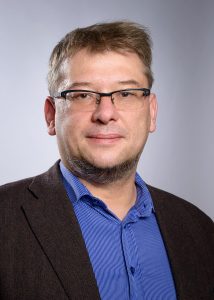Załęski Piotr

Załęski Piotr
dr mult. hab. Piotr Załęski – Ph.D. with habilitation in political science (2013, University of Warsaw), Ph.D. in ethnology (2009, Adam Mickiewicz University), Ph.D. in political science (2006, University of Warsaw), M.A. in political studies and social sciences (1999, University of Warsaw), as well as holder of postgraduate diploma in ethnology (2005, Nicolaus Copernicus University in Toruń) and education management (2001, University of Podlasie in Siedlce). He is a scholar and works as assistant professor at the Faculty of Political Science and International Studies, University of Warsaw.
In 2020, he was elected member of the Faculty Board. Before that, within the University of Warsaw, he served as member of the Education Board at the Faculty of Political Science and International Studies (2020), supervisor of a degree programme in Eurasian Studies at the Institute of Political Science (2015-2018), plenipotentiary of the Head of the Institute of Political Science for the degree programme in Eurasian Studies and its implementation (2014-2016), head of the Political Culture Workshop at the Institute of Political Science (2010-2016), editor of “Kultura i Polityka,” a collection issued by the Institute of Political Science (2012-2015), and finally coordinator for pedagogical education at the Faculty of Journalism and Political Science (2005-2010).
Since 2011, he has been responsible for coordinating the maturity exam in civics at the Central Examination Board, and since 2019, he has been an associate at the Centre for Education Development (Vademecum Nauczyciela project in civics). Prior to that, he coordinated an expert team at the Ministry of Education and Science for reducing maturity exam requirements in civics due to remote learning (2020), and an expert team at the Ministry of National Education for drawing up a general education curriculum in civics (2016-2019). He worked as an associate at regional examination boards in Jaworzno and Łomża, and authored draft papers for external examination in civics (2013-2020). In 2013-2015, he led the civics team in an ESF project to create a question bank for the national external examination. He served as scientific secretary at the Central Committee of the Poland and Contemporary World Knowledge Olympiad in 2013-2014, and in 1997-2007 worked as a teacher of civics and other subjects in the humanities and social sciences in various secondary schools (high schools, high schools for adults, vocational schools, junior high schools). He collaborated on civics textbooks in 2002 and 2005, and on introduction to business textbooks in 2003. He was awarded the Medal of the National Education Commission for outstanding contributions to education and upbringing in 2016.
He was supervisor of research project Tradycyjna kultura polityczna. Nieformalne więzi społeczne jako podstawa wartości i postaw społeczno-politycznych oraz zachowań politycznych w Kirgistanie na tle Azji Centralnej (2009–2011; Ministry of Science and Higher Education), and contractor for Etnopolityczne uwarunkowania funkcjonowania elity władzy politycznej w Azji Centralnej (2007–2008; Ministry of Science and Higher Education; supervisor: T. Bodio; resulting monography being rewarded by the Rector of the University of Warsaw). He served as grant reviewer for the Ministry of Science and Higher Education in 2009-2010 and expert supervisor for three PhD grants from the National Science Centre in 2011-2021, and he supervised two PhD students in political science (and administration).
He has participated in many ‘unsolicited’ international research programmes, including as supervisor of Tożsamość i pamięć historyczna w Azji Centralnej (2012–2014), co-supervisor of Kirgistan: problemy kulturowe i społeczno-polityczne (2009–2011), and participant in Współczesna Azja Centralna (1999–2009; supervisor: T. Bodio). In 2012-2016, he served as deputy chief editor of the “Społeczeństwo i Polityka. Pismo edukacyjne” quarterly, which at that time was a joint project of the Pułtusk Academy of Humanities and the Bishkek Humanities University.
Furthermore, he was research associate at the Institute of Philosophy and Political-Legal Research, National Academy of Sciences of the Republic of Kyrgyzstan (senior in 2008-2012, chief in 2012-2018), visiting professor at the Academy of Public Administration under the President of the Kyrgyz Republic (UNESCO Chair in Democracy in Multi-Ethnic and Multicultural Society, 2010-2011). He has sat in the Polish Ethnological Society, Polish Society for Educational Diagnostics, and the European Society for Central Asian Studies. Most of the international conferences he has attended in the past five years took place in Poland and Kyrgyzstan.
Research interests
Political culture in Poland and Central Asia, images of Central Asia in discourse and discourse of Central Asian elites, problems of historical memory in Poland and post-Soviet states, cultural identities and intercultural relations in Eurasia, history of political institutions in Central Asia and power elites in Central Asia, political socialisation and citizenship education, state education policy and educational diagnostics.
Unit
Department of Political History
Recent publications:
P. Załęski, Weryfikacja kompetencji obywatelskich polskich maturzystów – analiza na podstawie egzaminu z wiedzy o społeczeństwie z lat 2010–2019, Warszawa: Wydawnictwa Uniwersytetu Warszawskiego, 2021, 343 s., ISBN 978-83-235-4954-3, DOI: 10.31338/uw.9788323549628;
S. Dmowski, P. Załęski, Authoethnography in the study of football fan culture. Theoretical and methodological reflections by way of football rivarly research, „Human Affairs” 2021, vol. 31, nr 3, s. 324–334, DOI: 10.1515/humaff-2021-0027;
P. Załęski, Obrazy Konstytucji Marcowej w ówczesnym podręczniku do przedmiotu szkolnego „Nauka o Polsce współczesnej” [w:] 100-lecie Konstytucji Marcowej – przeszłość a teraźniejszość, red. W. Jakubowski, J. Wojnicki, P. Załęski, Warszawa 2022, s. 261–272, ISBN 978-83-8209-225-7.









